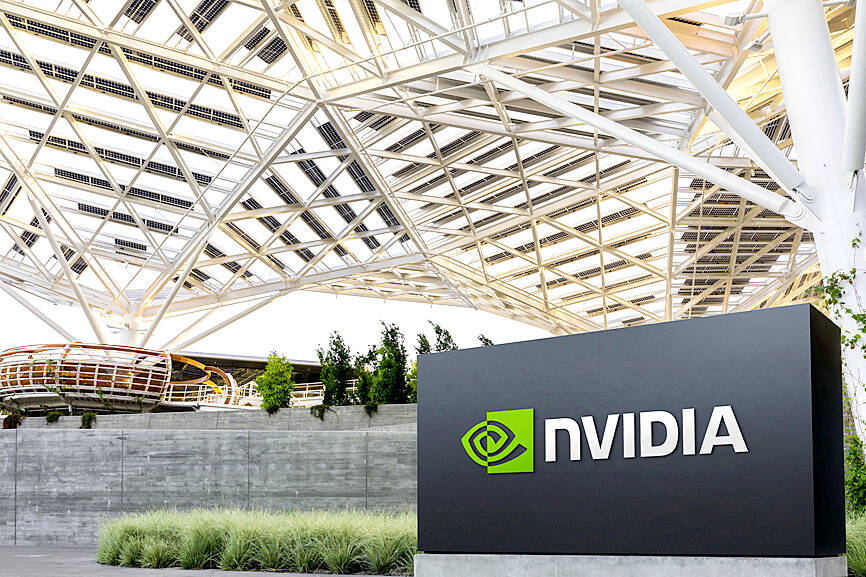US curbs on China have created a game of “catch me if you can” with US chip giant Nvidia Corp and other companies, which affect the interests of both countries and would accelerate Chinese innovation, the Global Times newspaper said on Saturday.
The chip industry newsletter SemiAnalysis reported earlier that Nvidia plans to release new artificial intelligence (AI) chips aimed at the Chinese market less than a month after the US tightened rules on selling high-end AI chips to China.
“The several rounds between Nvidia and the US government are the story of a high-tech enterprise that does legitimate business but encounters strong political interference in free trade, and tries every means to ensure its own survival and development,” the state-controlled newspaper said in a commentary. “For commercial companies, this is not funny at all, and even a bit sad.”

Photo: Reuters
The US restrictions on chips, which seek to stop China from obtainting cutting-edge US technologies to strengthen its military, were “not only harmful to China’s interests, but also to the US,” the newspaper said.
“What the US government has done makes normal and legitimate transactions tremble with fear, creating an intense atmosphere in the market,” it said.
Last month, Nvidia, whose graphics processing units (GPUs) dominate the AI market, said new US export restrictions would block sales of two high-end AI chips, the A800 and H800, that it created for the Chinese market last year, to comply with previous export rules.
The new rules capped how much computing power a chip can pack into a small size. They include what analysts call a “gray zone,” in which chips might still be allowed to ship to China, but require a license.
SemiAnalysis said the new Nvidia chips are called the HGX H20, L20 PCIe and L2 PCIe, and the company could announce them on Thursday.
The chips include most of Nvidia’s newest features, but have had some computing power measures cut back, the newsletter said.
Nvidia declined to comment.
The Global Times said that US companies had been looking for “workarounds” to comply with the regulations.
“It is not difficult to imagine that as long as Washington remains committed to ‘choking’ China, the game of ‘catch me if you can’ will continue indefinitely,” the newspaper said.
“In this sense, the ‘loopholes’ that the US is trying to close will never be completely fixed, and they will only find themselves in an awkward situation of pressing one end of the gourd only to make the other end float up,” it said.
“This will inevitably force and accelerate the process of independent innovation in high-tech industries in China,” it said.

Mercuries Life Insurance Co (三商美邦人壽) shares surged to a seven-month high this week after local media reported that E.Sun Financial Holding Co (玉山金控) had outbid CTBC Financial Holding Co (中信金控) in the financially strained insurer’s ongoing sale process. Shares of the mid-sized life insurer climbed 5.8 percent this week to NT$6.72, extending a nearly 18 percent rally over the past month, as investors bet on the likelihood of an impending takeover. The final round of bidding closed on Thursday, marking a critical step in the 32-year-old insurer’s search for a buyer after years of struggling to meet capital adequacy requirements. Local media reports

US sports leagues rushed to get in on the multi-billion US dollar bonanza of legalized betting, but the arrest of an National Basketball Association (NBA) coach and player in two sprawling US federal investigations show the potential cost of partnering with the gambling industry. Portland Trail Blazers coach Chauncey Billups, a former Detroit Pistons star and an NBA Hall of Famer, was arrested for his alleged role in rigged illegal poker games that prosecutors say were tied to Mafia crime families. Miami Heat guard Terry Rozier was charged with manipulating his play for the benefit of bettors and former NBA player and

The DBS Foundation yesterday announced the launch of two flagship programs, “Silver Motion” and “Happier Caregiver, Healthier Seniors,” in partnership with CCILU Ltd, Hondao Senior Citizens’ Welfare Foundation and the Garden of Hope Foundation to help Taiwan face the challenges of a rapidly aging population. The foundation said it would invest S$4.91 million (US$3.8 million) over three years to foster inclusion and resilience in an aging society. “Aging may bring challenges, but it also brings opportunities. With many Asian markets rapidly becoming super-aged, the DBS Foundation is working with a regional ecosystem of like-minded partners across the private, public and people sectors

BREAKTHROUGH TECH: Powertech expects its fan-out PLP system to become mainstream, saying it can offer three-times greater production throughput Chip packaging service provider Powertech Technology Inc (力成科技) plans to more than double its capital expenditures next year to more than NT$40 billion (US$1.31 billion) as demand for its new panel-level packaging (PLP) technology, primarily used in chips for artificial intelligence (AI) applications, has greatly exceeded what it can supply. A significant portion of the budget, about US$1 billion, would be earmarked for fan-out PLP technology, Powertech told investors yesterday. Its heavy investment in fan-out PLP technology over the past 10 years is expected to bear fruit in 2027 after the technology enters volume production, it said, adding that the tech would